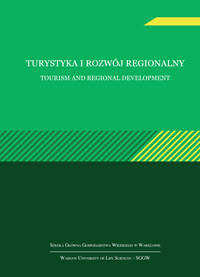Main Article Content
Article Details
Ahokangas, P., Alila, H., Helaakoski, H., Kyllonen, V., Lehtimaki, T., Peltomaa, I., Seppanen, V., Tanner, H. (2015). Collaborative business networks of the future. VTT Technical Research Centre of Finland Ltd. Available at: https://publications.vtt.fi/julkaisut/muut/2015/Collaborative-Business-Networks.pdf (access:13.07.2023).
Armaitienë, A. (2004). Turizmo ir rekreacijos specialistř rengimo Lietuvos universitetuose problemř refleksijos Europos Sajungos plëtros sŕlygomis. Tiltai (1), pp. 63–69.
Bailey, C., Mankin, D., Kelliher, C., Garavan, T. (2018) Strategic Human Resource Management (2nd edition). Oxford University Press.
Baum, T. (2001). Education for tourism in a global economy. In: Wahab, S., Cooper, C. (Eds). Tourism in the age of globalization. London: Routledge, pp. 198–212.
Baum, T., Szivas, E. (2008). HRD in tourism: A role for government? Journal of Tourism Management 29, pp. 783–794.
Diffley, S., McCole, P., Carvajal-Trujillo, E. (2018). Examining Social Customer Relationship Management Among Irish Hotels. International Journal of Contemporary Hospitality Management 30 (2), pp. 1072–1091.
Farndale, E., Paauwe, J. (2018). SHRM and context: Why firms want to be as different as legitimately possible. Journal of Organizational Effectiveness: People and Performance 5 (3), pp. 202–210.
Freeman, R., Harrison, J. S., Wicks, A. C., Parmar, B. L., de Colle S. (2010). Stakeholder theory. The State of the Art. Cambridge University Press.
Giedraitis, A., Ribačonka, E. (2019). Tarporganizaciniř ryđiř verslo organizacijř tinkluose tobulinimo teoriniai aspektai. Regional Formation and Development Studies 2 (28), pp. 65–73.
Gulati, R., Wohlgezogen, F., Zhelyazkov, P. (2012). The Two Facets of Collaboration: Cooperation and Coordination in Strategic Alliances. Academy of Management Annals 6 (1), pp. 531–583.
Hall, C. M. (1994) Tourism and politics: policy, power and place. John Wiley & Sons.
Hopenienë, R., Railienë, G., Kazlauskienë, E. (2009). Potential of Virtual Organizing of Tourism Business System Actors. Engineering Economics 3, pp. 75–85.
Huxham, Ch., Vangen, S. (2005). Managing to Collaborate. The theory and practice of collaborative advantage. London and New York: Routledge.
Iđoraitë, M. (2009). Importance of Strategic Alliances in Company’s Activity. Intelektinë ekonomika 1 (5), pp. 39–46.
Jaworski, C., Ravichandran, S., Karpinski, A. C., Singh, S. (2018). The effects of training satisfaction, employee benefits, and incentives on part-time employees’ commitment. International Journal of Hospitality Management 74, pp. 1–12.
Jooss, S., Burbach, R. (2017). Assessing the degree of human resource innovation: An exploratory analysis of Irish hotel corporations. Electronic HRM in the Smart Era, pp. 33–57. DOI: http://doi.org/10.1108/978-1-78714-315-920161002
Katunian, A. (2021). Turizmo ţmogiđkřjř iđtekliř vystymas tarpinstitucinio bendradarbiavimo kontekste. Dissertation. Vilnius: Mykolas Romeris University.
Katunian, A., Žirnelë, L. (2018). Modeling the Tourism Specialist Competencies. New Skills Agenda for Europe. Case Study of Lithuanian Tourism Sector. Available at: https://thi.fthm.hr/congress-proceedings/category/5-2018 (access: 13.07.2023).
Leng Leng Chong, J. (2013). Sustainability of Collaborative Networks in Healthcare: A Resources and Capabilities Perspective. PhD thesis. Auckland: Auckland University of Technology.
Liu, A., Wall, G. (2006). Planning tourism employment: A developing country perspective. Tourism Management 27, pp. 159–170.
Navickas, V., Malakauskaitë, A. (2009). Tarporganizaciniř verslo ryđiř formavimosi turizmo sektoriuje prielaidos. Economics & Management 14, pp. 863–870.
Nolan, C. T., Garavan T. N., Lynch P. (2020). Multidimensionality of HRD in small tourism firms: a case study of Republic of Ireland. Tourism Management 79, pp. 1–15.
Provan, K. G., Fish, A., Sydow, J. (2007). Inter-organizational networks at the network level: Review of the empirical literature on whole networks. Journal of Management 33 (3), pp. 479–516.
Raišienė, A. G. (2008). Tarporganizacinės sąveikos turinys Lietuvos vietos savivaldos praktikų požiūriu. Jurisprudencija, Mokslo darbai 4 (106), pp. 50–60.
Raišienė, A. G. (2011). Tarnautojų požiūris į partnerystę skatinančius veiksnius vietos savivaldoje (pranešimas, Vilnius, MRU). Available at: https://www.mruni.eu/mru_lt_dokumentai/fakultetai/politikos_ir_vadybos_fakultetas/Konferencija_SVK/2%20sekcija/Raisienei.pdf (access: 13.07.2023).
Schuler, R. S., Jackson S. E. (2006). Human Resource Management: international perspectives. Thomson South-Western, Mason, OH.
Sung, S. Y., Choi, J. N. (2018) Effects of training and development on employee outcomes and firm innovative performance: Moderating roles of voluntary participation and evaluation. Human Resource Management 57 (6), pp. 1339–1353.
Tarpžinybinis bendradarbiavimas nacionaliniu lygmeniu jaunimo politikos srityje. SSGG analizë, pp. 23–24. Available at: http://ijpp.lt/file/TB_ANALIZE.pdf (access: 13.07.2023).
Velasco, M. (2017). Tourism Policy. In: Ali Farazmand (Ed.) Global Encyclopedia of Public Administration, Public Policy, and Governance. Springer International Publishing, p. 3. Available at: https://www.researchgate.net/profile/Maria-Velasco-3/publication/314089854_Tourism_Policy/links/5b47b22c45851519b4b465e6/Tourism-Policy.pdf (access: 13.07.2023).
Downloads
- Monika Wojcieszak-Zbierska, Rural women’s health: examples of programs designed to support the health aspect of female rural population , Turystyka i Rozwój Regionalny: Nr 19 (2023)
Możesz również Rozpocznij zaawansowane wyszukiwanie podobieństw dla tego artykułu.
- Kateryna Fedosova, Alina Katunian, The use of Artificial Intelligence in the restaurant business , Turystyka i Rozwój Regionalny: Nr 22 (2024)
- Alina Katunian, Jolita Variakojiene, Lina Zirnele,, Theoretical and practical assumptions of the business travel organization. Lithuanian case , Turystyka i Rozwój Regionalny: Nr 13 (2020)
- Alina Katunian, Analiza rozwoju kapitału ludzkiego kadry branży turystycznej na Litwie , Turystyka i Rozwój Regionalny: Nr 6 (2016)

Utwór dostępny jest na licencji Creative Commons Uznanie autorstwa – Użycie niekomercyjne 4.0 Międzynarodowe.





